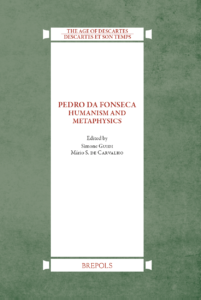 Also known as the “Portuguese Aristotle”, Pedro da Fonseca S. J. (1527-1599) was a prominent figure in early modern scholasticism and particularly in the history of the Society of Jesus. He laid the groundwork for the publication of the famous Cursus Conimbricensis (1592- 1606) and was the author of an influential textbook of logic and dialectic, the Institutionum Dialecticarum Libri Octo (1564), officially recommended by the Ratio Studiorum. He was also one of the most important and recognized commentators on Aristotle’s Metaphysics in the 16th century (with his unfinished Commentaria, 1577-1612).
Also known as the “Portuguese Aristotle”, Pedro da Fonseca S. J. (1527-1599) was a prominent figure in early modern scholasticism and particularly in the history of the Society of Jesus. He laid the groundwork for the publication of the famous Cursus Conimbricensis (1592- 1606) and was the author of an influential textbook of logic and dialectic, the Institutionum Dialecticarum Libri Octo (1564), officially recommended by the Ratio Studiorum. He was also one of the most important and recognized commentators on Aristotle’s Metaphysics in the 16th century (with his unfinished Commentaria, 1577-1612).
This volume is the first collection of essays in English devoted to Fonseca, his intellectual endeavour, and thought. The book brings together some of today’s leading specialists in early modern scholasticism, Portuguese Aristotelianism, and the history of the Society of Jesus, in order to present a reliable portrait of Fonseca’s institutional role, to reconstruct his thought on many important aspects of scholastic metaphysics, and to discuss the reception of his work in the early modern age.
Simone Guidi is currently a Researcher at the National Research Council of Italy, Institute for the European Intellectual Lexicon and History of Ideas. His work deals mainly with Late Scholasticism and the philosophy of René Descartes. He is the scientific coordinator of the project Conimbricenses.org and the author of several books, articles and book chapters devoted to aspects of early modern metaphysics, science and theology.
Mário Santiago de Carvalho is a Full Professor of Philosophy at the University of Coimbra, Portugal. He is the author of several books and scientific papers related to his main research fields, Portuguese Aristotelianism, Medieval Philosophy, Metaphysics, and Philosophy of Music. He translated Greek and Latin philosophical texts, and is currently supervising the bilingual edition of the Commentarii Collegii Conimbricensis Societatis Iesu. He is the scientific director of the project Conimbricenses.org.
Contents
- Simone Guidi and Mário Santiago de Carvalho, Introduction. Pedro da Fonseca: A Sixteenth-Century Humanist and Metaphysician
Section I: Fonseca and Jesuit Pedagogy
- Cristiano Casalini (Advanced Institute for Jesuit Studies, Boston College), Pedro da Fonseca: Humanism and the Jesuit Quest for a Philosophical Pedagogy
- Mário Santiago de Carvalho (Universidade de Coimbra), Pedro da Fonseca’s Presence in the ‘Coimbra Jesuit Course’. A First Assessment
Section II: Disputing on Fonseca
- João Rebalde (Universidade do Porto), Pedro da Fonseca’s Doctrine on the Middle Knowledge
- Daniel Heider (University of South Boemia), Pedro da Fonseca’s Halfway Reductionism of Internal Senses in Light of Mastri and Belluto’s Critique
Section III: Fonseca’s Metaphysics in Context
- Victor Salas (Sacred Heart Major Seminary), Pedro da Fonseca on the Scope and Unity of Metaphysics
- António Manuel Martins (Universidade de Coimbra), Pedro da Fonseca on Categorical Relations
- Giuseppe Capriati (Università del Salento), Pedro da Fonseca on Causality
- Igor Agostini (Università del Salento), The Transcendental Properties of Ens and the Doctrine of Unum in Pedro da Fonseca. A perspicuous case of neglected Platonic origins of the Metaphysica generalis
- Simone Guidi (CNR-ILIESI), Pedro da Fonseca on Substance, Subsistence, and Suppositum
Bibliography